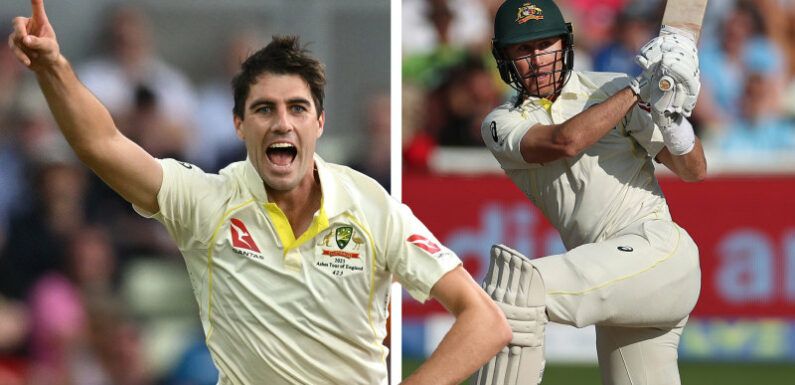
Save articles for later
Add articles to your saved list and come back to them any time.
Pat Cummins and Marnus Labuschagne have accepted three-year Cricket Australia contracts and two-year deals have been handed to six others as Twenty20 franchises continue to circle around the world’s top cricket talent.
The willingness of CA to offer as many as eight multi-year deals, to players seen as key performers across numerous formats, is a sign of the times.
Pat Cummins and Marnus Labuschagne have signed three-year Cricket Australia contracts.Credit: Getty Images
New leagues in South Africa and the UAE are competing with the Big Bash League and there is the prospect of a major entry into cricket by Saudi Arabia in coming years.
These deals, finalised after CA announced its list of centrally contracted players in April, were confirmed to this masthead by multiple sources speaking on condition of anonymity because negotiations are confidential. CA declined to comment.
In addition to Test and ODI captain Cummins, who signed a deal this year that would keep him on Australian duty until at least the end of the Ashes summer in 2025-26, the Test No.3 Labuschagne was also handed a long-term contract.
Notably, men’s head coach Andrew McDonald’s four-year term with CA also runs to the end of the 2025-26 season.
Other players handed two-year packages, following the successful signing of a new pay deal between CA and the Australian Cricketers Association, are Travis Head, Steve Smith, Cameron Green, Mitchell Starc, Alex Carey and Josh Hazlewood.
The inclusion of Carey and Green in this select group underlines their central place in Australia’s plans, despite the fact both currently find themselves outside the team playing in the ODI World Cup in India.
Neither Nathan Lyon nor Usman Khawaja are in the multi-year list, reflecting their advancing years and also specialisation in one format of the game. Nevertheless, each remain in the selectors’ plans for the future beyond this home summer.
David Warner, who has already flagged that he will retire from Tests at the end of the Pakistan series in January, was another handed a one-year contract. The overall number of contracts was increased to a maximum of 24 this year, with greater security afforded to more players via multi-year deals.
“The NSP support and endorse the change to the MOU agreement which allows further scope for additional contracts,” selection chair George Bailey said when announcing the contract list, “which in turn creates additional depth to call on in the next period, as well as retaining the ability to utilise others from outside of this list.”
Players and their managers spoken to by this masthead insist that the acceptance of the deals does not equate to complete satisfaction with the terms struck earlier this year, particularly as the major uplift in pay was allotted to the BBL rather than central contracts.
Pointedly, they raised the recent examples of Chris Lynn – who signed with a UAE franchise after leaving Brisbane Heat before a compromise was struck – and also the special terms for Warner and Smith to sign up for BBL clubs last year as examples of how greater flexibility will be required in the future.
Nick Hockley, the CA chief executive, acknowledged the increased competition for players – both from other sports and the Twenty20 franchise world – when the pay deal was announced. “There is a war for talent out there,” he said in April.
Moreover, CA’s mass offer of multi-year deals stands in contrast to the vast majority of seasons since consolidated central contracts were first offered, as far back as the 1986-87 summer.
Between then and now, multi-year deals were offered only occasionally, with three-year deals exceptionally rare: Ricky Ponting and Brett Lee were two such players to be handed those terms at various times.
It’s a system that was a huge part of Australia’s success in subsequent years, as players were given a sole focus on international performances and others aspired to do likewise via the lean proving ground of the Sheffield Shield.
By contrast, England did not offer central contracts to its players until 1999, allowing the then Australian Cricket Board more than a decade head start that was to be reflected across eight successive Ashes series wins up to 2005.
The ECB has faced its own contract stresses in recent months, as England players baulked at signing multi-year deals. They did so amid mounting interests from franchises from both established leagues such as the IPL but also new tournaments in the UAE, United States and South Africa.
In parallel, Saudi Arabian interest in forming its own lucrative T20 league has not waned, underlined by recent comments by the England captain Ben Stokes – reputedly on the receiving end of a $50 million offer over five years.
“You can’t compete with money, especially the money that Saudi Arabia is throwing around to certain people,” Stokes told Bloomberg last month.
“People can be at different points in their lives and different points in their careers, where other things matter more to them than other things.”
News, results and expert analysis from the weekend of sport sent every Monday. Sign up for our Sport newsletter.
Watch every Australian game plus other big match-ups live and free on Nine, 9Gem and 9Now.
Join us for live coverage online of every Australian match with our live blogs.
Most Viewed in Sport
From our partners
Source: Read Full Article
